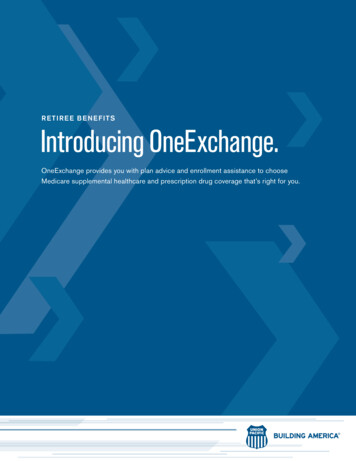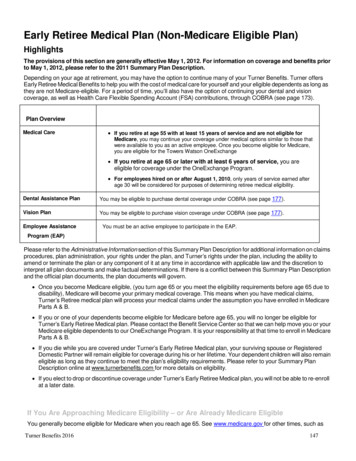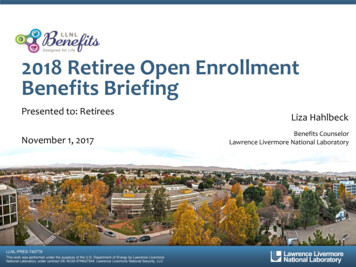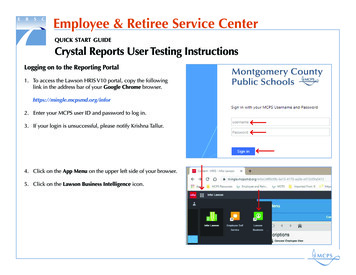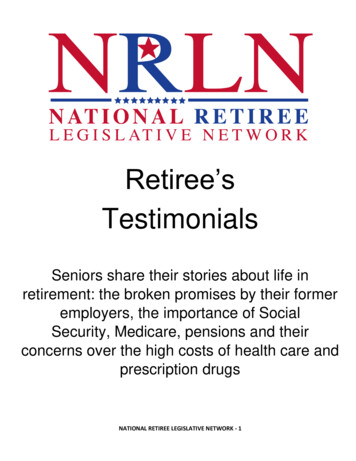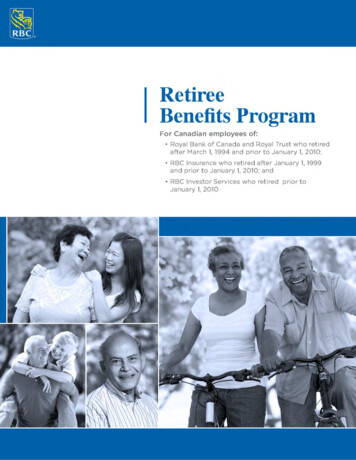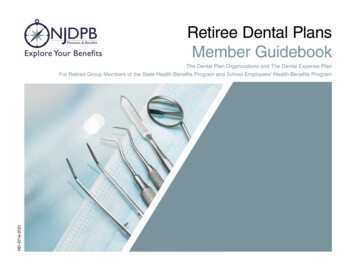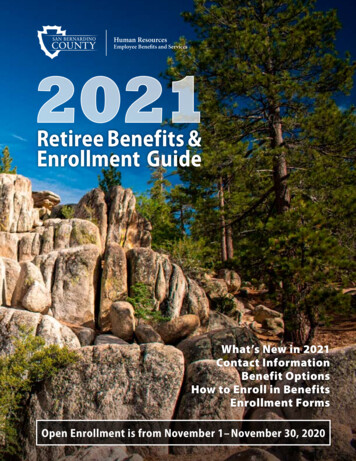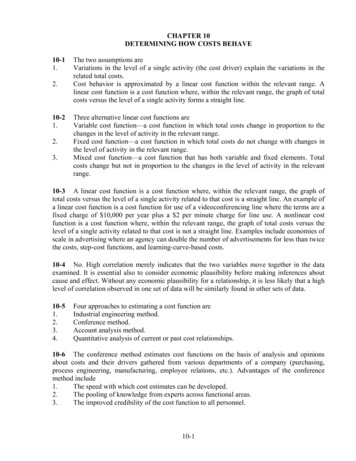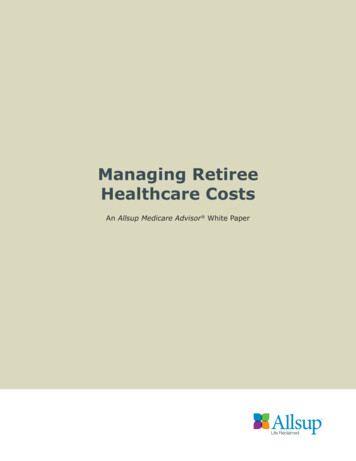
Transcription
Managing RetireeHealthcare CostsAn Allsup Medicare Advisor White Paper
Managing Retiree Healthcare CostsAn Allsup Medicare Advisor White PaperIn today’s tough economic environment, employers are challenged with being able toprovide competitive employee benefits without affecting business profitability. Withthe costs of healthcare coverage continuing to rise, it’s becoming increasingly difficultto keep costs down while providing for employees’ needs.Adding to the confusion about managing costs is healthcare reform and what it couldmean to the way employers provide retiree benefits. Many organizations are seekingassistance to understand what provisions in the recently-enacted healthcare reformlegislation will affect them and how.Despite all the confusion and potential roadblocks to cutting the rising cost ofproviding healthcare coverage to retirees, employers have many options to choosefrom when handling their retiree benefits.What Your Company Can DoAccording to a recent Kaiser Family Foundation study, households with Medicarerecipients spent 14.1 percent of household income on healthcare, compared with 4.3percent in non-Medicare households1. Because people with Medicare tend to use theircoverage so much more than those without, your population of Medicare-eligibleretirees may offer the most immediate and largest cost savings for employerscovering these individuals.Additionally, a 2007 EEOC ruling2 opened the door for employers to create twoseparate classes of retirees: one eligible for Medicare and one not eligible forMedicare. Since those eligible for Medicare have access to comprehensive coveragethrough a combination of Medicare programs, many employers are considering theoption of eliminating retiree healthcare benefits, reducing their costs and lesseningfinancial liability at the same time.How Does Healthcare Reform Affect Employer Options?Although healthcare reform is expected to significantly change the individual andemployer healthcare insurance landscape long term, the choices for funding yourorganization’s Medicare-eligible retiree population will remain largely the same forthe foreseeable future. Healthcare reform will affect some aspects of Medicare –including free preventive services under Medicare Part B, reduced reimbursementsto providers in Medicare Advantage networks and phasing out the donut hole inprescription drug coverage – but changes to Medicare don’t mean changes to anorganization’s options with respect to Medicare-eligible individuals.122Cubanski, Juliette, Anthony Damico and Tricia Neuman, Health Care on a Budget: AnAnalysis of Spending in Medicare Households, 2009.EEOC Ruling on Retiree Benefits and Medicare, Findlaw.com, 2007
Managing Retiree Healthcare CostsAn Allsup Medicare Advisor White PaperDeciding Which Path to ChooseThere are many factors to weigh when choosing a course to recommend to yourorganization. Depending upon your organization’s culture, financial health andcontractual commitments made to retirees and other employees, you may find thatcost reductions are paramount. Or, the biggest concern could be simply costcontainment – keeping costs stable, while at the same time guiding retirees througha very confusing and frustrating decision making process. So, when thinking aboutwhich route to take, consider the following: How much does your company need to save?For employers who decide to phase out or eliminate retiree coverage, considereasing the transition with a Medicare plan selection service like Allsup MedicareAdvisor . At minimal or no cost, your company will see immediate savings fromreducing healthcare coverage and be better able to manage retirees’ confusionby easing their transition into the open Medicare market instead of dropping themin abruptly without assistance. Is your organization concerned about retiree confusion and disruption?Employers who need to reduce or eliminate coverage often are concerned aboutmanaging retiree confusion and dissatisfaction. One good way to do this could beusing a Medicare plan selection service such as Allsup Medicare Advisor. What type of administrative infrastructure does your company have?Employers who need or want to keep providing coverage to Medicare-eligibleretirees, should consider what their administrative infrastructure is like and whattype of administrative burden they can handle. Most employers find it easier andmore financially beneficial to contract with a company that can offer an employergroup waiver plan (EGWP), or a Medicare plan restricted only to an employer’sretirees. In this case, the employer does not have to create a relationship with thefederal government to offer a Medicare plan, but can contract with someone elsewho already has such a relationship. And in addition to providing the employerwith a certain amount of distance from the federal government, creating an EGWPallows employers to take advantage of the contracting insurance company’sexpertise in Medicare and other matters, such as health and wellness, drugutilization management and more. Does your company have contractual obligations to retirees?Employers who deal regularly with unions or other contract employees are familiarwith the challenges such relationships can bring, particularly when dealing withretiree healthcare coverage. If your company employs many union workers orcontractors, there may be no choice in providing coverage to retirees. If you arerequired to provide comprehensive coverage to your retirees, your organizationmay use Medicare and alternative funding combinations to reduce the cost ofproviding it.3
Managing Retiree Healthcare CostsAn Allsup Medicare Advisor White Paper Does your organization have Governmental Accounting StandardsBoard/Federal Accounting Standards Board (GASB/FASB)reporting requirements?Many employers now have to report to the federal government how theirhealthcare is funded – or not funded. In other words, employers who have toreport to GASB or FASB must indicate what type of healthcare coverage they’vepromised their retirees and if they will be able to meet these obligations.Unfunded healthcare coverage (the promise of coverage not backed by actualdollars) is reported as a liability and could affect an organization’s credit rating,making it more difficult for them to secure loans if necessary. Certain fundingvehicles can reduce healthcare coverage liability, which could make it easier tosecure a line of credit if one is needed.What Are Your Options?Depending upon the situation, your organization’s objectives and retirees’ needs,there are many options when it comes to reducing healthcare costs. Below is adescription of primary options:1.Reduce or eliminate coverage for Medicare-eligible retirees. This is themost drastic option and, while it comes with immediate savings, it also comeswith significant retiree disruption and a higher short-term administrativeburden. To manage dissatisfaction and foster goodwill, employers shouldconsider encouraging retirees to use a Medicare plan selection service, likethat offered by Allsup Medicare Advisor, which helps Medicare-eligibleindividuals find the right plan based on their needs.2. Take advantage of government dollars. If your organization is required toprovide retiree healthcare coverage or would prefer to do so, federal dollarscan be used to take advantage of reimbursements available through Medicare:4a.Apply for the Retiree Drug Subsidy (RDS). When the MedicareModernization Act of 2003 was implemented in 2006, many employerswere strongly encouraged by the federal government to takeadvantage of the RDS. Companies who use this option continue tooffer Medicare-eligible beneficiaries coverage, but can apply to thefederal government to receive a 28 percent subsidy on each PartD-eligible claim when offering coverage as good as or better than thatoffered under Medicare’s prescription drug benefit. The upside of theRDS is that generally retirees won’t notice a change in how theircoverage works and budget dollars can be saved on prescription drugcoverage. The downside is that it will require some amount ofongoing administrative burden and, because only drug claims arereimbursed, the savings aren’t as much as offering a Medicare plan.b.Offer a Medicare Plan. An EGWP can include medical andprescription drug coverage, or just medical or just prescription drugcoverage. This option is gaining popularity because, although it does
Managing Retiree Healthcare CostsAn Allsup Medicare Advisor White Paper3.5require some amount of administrative burden, employers have theflexibility of offering such a plan by either contracting directly with thefederal government or by contracting with a plan that already has acontract with the federal government. Regardless of which option ischosen, reimbursements are made on a per-person basis forparticipating Medicare-eligible individuals. So, employers areguaranteed at least a certain amount of subsidy per person(usually higher than the average subsidy through the RDS) and couldreceive even more for individuals eligible for low-income subsidy (LIS) orwho reach catastrophic coverage. But this path does requiresignificant administrative infrastructure. Also, depending upon thecoverage being offered now, retirees could experience some confusionbecause the way their benefits work could change significantly.Use alternative funding vehicles. Employers also can consider using other,privately-funded vehicles to provide healthcare coverage. These fundingvehicles can be used independently to purchase non-Medicare group coveragefor Medicare-eligible individuals or as umbrella accounts to provide retireeswith an employer-run Medicare plan, or EGWP. The following is a descriptionof each.a.Form a Voluntary Employee Benefit Association (VEBA). Manyemployers, particularly those with certain contractual obligationsprefer to form a VEBA. VEBAs are trusts that allow employers tocontribute a one-time monetary distribution or periodic distributions ofcapital, which then are managed by an administrator. One benefit ofa VEBA is that they’re flexible and can work well with other fundingoptions, such as a Medicare plan. Employers also can hand off theadministration of a VEBA to an expert vendor, allowing the employerto focus on their active employees. But there is a significantdownside, especially for retirees: there is no requirement that a VEBAremain financially solvent. Choosing the wrong organization tomanage a VEBA can mean the VEBA may quickly run out of funds,leaving retirees who expected to have healthcare coverage without itand responsible for finding their own plan. VEBAs are considered aseparate entity from the employer, which many employersfind attractive.b.Create a 115 trust. These trusts, also known as Other than PensionEmployee Benefits (OPEB) accounts, work very similarly to VEBAs. LikeVEBAs, 115 trusts can be used to purchase Medicare or other coveragefor retirees and can be managed by a third-party administrator. Theyalso can become insolvent if not managed properly. Unlike a VEBA, a115 trust is not considered separate from the employer and mayeventually revert back to the founding organization.
Managing Retiree Healthcare CostsAn Allsup Medicare Advisor White PaperMaking the Right Choice Is CrucialAs more and more employees approach retirement and the demand increases forbenefits-related resources, many Human Resources or Benefits departments are notfully prepared to meet this growing need. Allsup Medicare Advisor can provide theexpert knowledge and guidance to help your organization and your employees clearlyunderstand all the options that are available.Why Allsup?Allsup is a nationwide provider of Social Security disability, Medicare and MedicareSecondary Payer Compliance services for individuals, employers and insurance carriers. Founded in 1984, Allsup employs nearly 700 professionals who deliver specialized services supporting people with disabilities and seniors so they may lead livesthat are as financially secure and healthy as possible.As trusted experts who specialize in this area, we know first-hand that choosing theright path for your Medicare-eligible retirees can be complicated and frustrating. WithAllsup Medicare Advisor’s in-depth approach, both employers and employees willbenefit from our specialized program. To learn more about how Allsup MedicareAdvisor can assist you and your employees with the challenges associated byswitching to Medicare, please visit ama.allsupinc.com or call Allsupat (888) 660-2779.Allsup does not provide tax, legal, investment, insurance, financial planning ormedical advice or counsel under the Allsup Medicare Advisor and related services.The individual is responsible for making all decisions with respect to the products orservices utilized under Allsup Medicare Advisor, including but not limited to selectinga Medicare Advantage plan that best matches specific needs, and for obtaining anypersonal tax, legal, investment, insurance, financial planning, medical or other adviceor counsel that is believed necessary or advisable with respect to such productsor services.6
Allsup Medicare Advisor’s in-depth approach, both employers and employees will benefit from our specialized program. To learn more about how Allsup Medicare Advisor can assist you and your employees with the challenges associated by switching to Medicare, please
